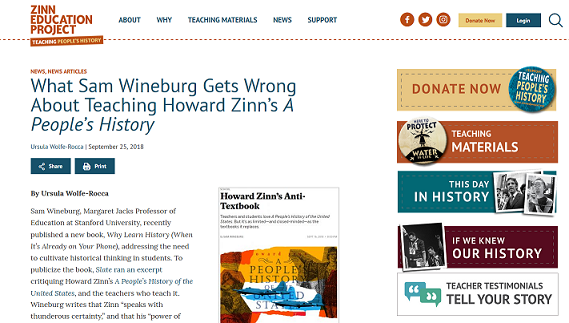
The Zinn Education Project has published a fine response to an article based on Sam Wineburg’s book, “Howard Zinn’s Anti-Textbook.”
In what seems to me indication of increased influence of Right wing ideas in schools of education, related to increased right-wing funding to universities, Wineburg, holds a prestigious perch in history of education at Stanford. Another endowed chair at Stanford was held by the late David Tyack, author of a seminal history of the development of urban schools, The One Best System. It influenced an entire generation of historians of education and is still worth reading to understand many contemporary debates about school reform.
Wineburg published an article with the contour of this same attack on Zinn in “The American Educator,” the magazine published by the American Federation of Teachers (AFT). Historians and teachers who use Zinn’s work asked to respond to Wineburg’s piece. The AFT refused. After much public shaming on social media, the union relented and allowed the Zinn Education Project to publish a letter with a link to a fuller rebuttal of Wineburg’s argument.
Ursula Wolfe-Rocca’s thoughtful, nuanced review of ideas in Wineburg’s book is as much about teaching history as it is history itself, as it should be, because Wineburg's attack is in part about teaching history. However, Wineburg's mission is deeper and broader, actually as much or more ideologically driven than Zinn’s, reflecting "centrist" liberal fears about sullying the narrative about American progress pushed by most textbooks, pundits, and Democrats. Wolfe-Rocca, a social studies teacher, discusses Wineburg’s flawed (and elitist) pedagogical assumptions (he doesn’t bother looking at how teachers actually use Zinn’s work). She then explains “Wineburg completely ignores a crucial difference between A People’s History and standard corporate textbooks: Zinn does not disavow his own voice or power in shaping the history he offers; he makes it explicit.”
As she explains, Wineburg is willing to concede A People’s History acquaints students with history "too often hidden and too quickly brushed aside by traditional textbooks.” But "he seems strangely uninvested in the necessity of such a project, as if writing bottom-up history and representing the experiences of traditionally marginalized groups is just another polemical trick.”
Wineburg, like the liberals whose narrative he endorses, rightly sees Zinn's work as a challenge to accepting the status quo as inevitable. The review is worth reading if you care about how history is – and should be – taught. Other essays addressing the attempts to discredit Zinn’s work, along with free, topical materials for teaching history, are on the Zinn Education Project website.


Ridiculous quest there. What occurred after? Thanks!